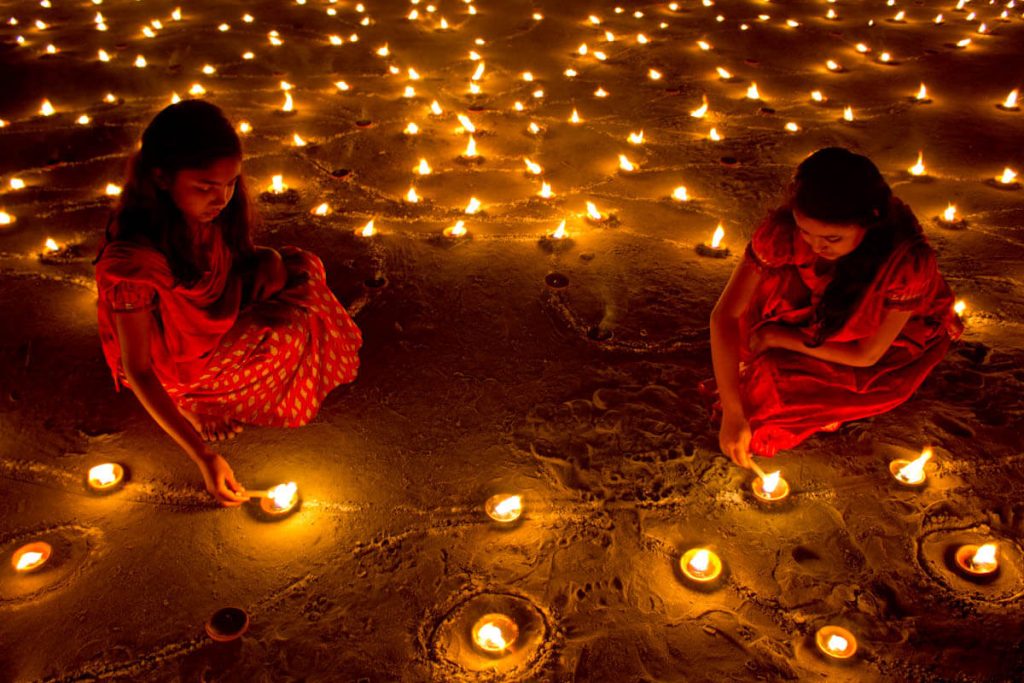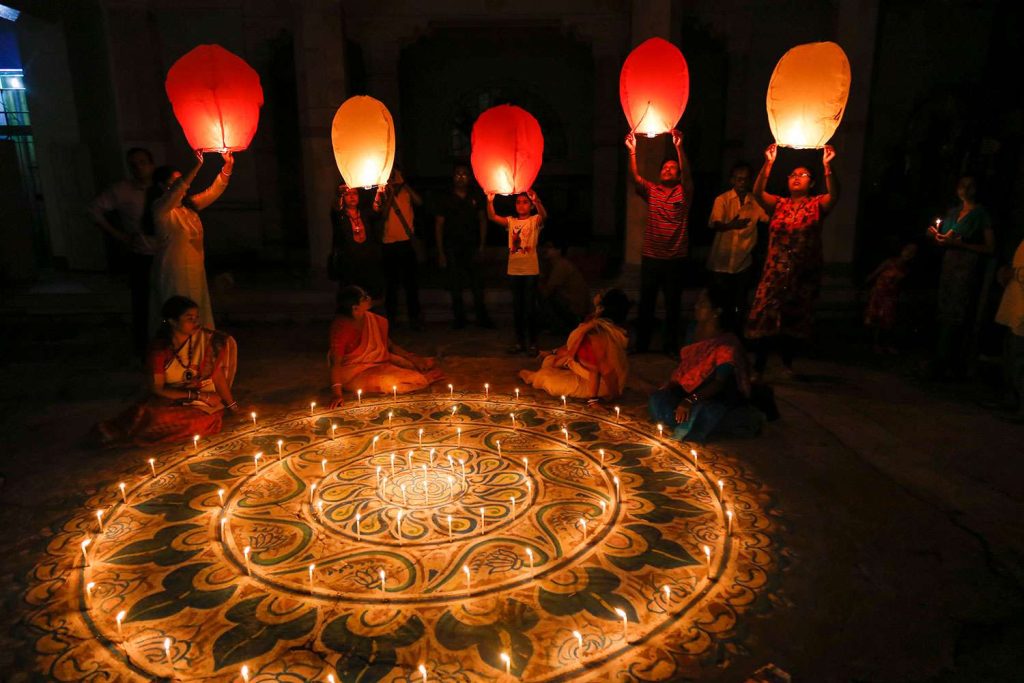Diwali, also known as the Festival of Lights, is one of the most significant and widely celebrated festivals in India. It symbolizes the victory of light over darkness and good over evil. Diwali is a time for families and communities to come together, exchange gifts, and enjoy festive feasts. The festival typically lasts for five days, with each day holding its own special significance and customs.
One of the most important rituals of Diwali is the lighting of diyas, or oil lamps, which are believed to ward off evil spirits and bring prosperity and good luck. Fireworks are also a common sight during Diwali, symbolizing the joy and celebration that accompanies the festival.
Another important aspect of Diwali is the tradition of cleaning and decorating homes. People often spend weeks preparing for the festival by scrubbing their homes clean and adorning them with colorful rangoli designs, flowers, and lights. This practice is believed to invite the goddess Lakshmi, the goddess of wealth and prosperity, into the home. Many people also buy new clothes and jewelry to wear during Diwali, as it is considered auspicious to start the new year with new possessions.
One of the most anticipated aspects of Diwali is the delicious food that is prepared and shared during the festival. Families often come together to cook traditional dishes like sweets, savories, and special meals to celebrate the occasion. Popular sweets like ladoos, jalebi, and kheer are enjoyed by all, while savory snacks like samosas and pakoras add to the festive atmosphere. Food plays a central role in Diwali celebrations, with feasting and sharing meals with loved ones being an important part of the festivities.
Gift-giving is also a common practice during Diwali, as people exchange presents with family, friends, and neighbors as a symbol of love and goodwill. It is customary to give sweets, dry fruits, and other treats as gifts during the festival. Many people also exchange decorative items, jewelry, and clothes as a way of showing appreciation and strengthening relationships. The act of giving gifts during Diwali is seen as a gesture of kindness and generosity, and is believed to bring good fortune to both the giver and the receiver.
Overall, Diwali is a time of joy, celebration, and togetherness for people of all ages and backgrounds. The festival brings communities together in a spirit of unity and harmony, fostering a sense of belonging and connection among all who participate. The colorful lights, festive decorations, delicious food, and joyful atmosphere make Diwali a truly special and memorable occasion for all who celebrate it. As the Festival of Lights approaches in 2023, people all over India are eagerly preparing to usher in the new year with love, light, and happiness

Understanding Diwali: The Celebration’s Significance
Diwali, also known as the Festival of Lights, is one of the most important Hindu festivals celebrated in India and around the world. The festival signifies the victory of light over darkness, good over evil, and knowledge over ignorance.
It is a time when people come together to celebrate the triumph of good over evil through the lighting of lamps and fireworks. Diwali is a time for family and friends to gather, exchange gifts, and share delicious food. The festival is also a time for reflection and renewal, as people clean their homes and decorate them with colorful rangoli designs.
The significance of Diwali goes beyond just a religious celebration; it is a time for people to come together in unity and peace, to spread joy and happiness, and to remember the importance of kindness and compassion towards others. Overall, Diwali is a time to celebrate the victory of light and knowledge in our lives, and to remember the importance of spreading positivity and love to all those around us.
Diwali Traditions: A Blend of Rituals and Celebrations
Diwali, also known as the Festival of Lights, is one of the most important festivals in Hindu culture. It is a time when families come together to celebrate the triumph of light over darkness and good over evil. The traditions of Diwali are deeply rooted in ancient Hindu mythology and are a blend of rituals and celebrations that have been passed down through generations.
One of the most well-known traditions of Diwali is the lighting of oil lamps, or diyas, which symbolizes the victory of light over darkness. In addition to lighting lamps, families also decorate their homes with colorful rangoli patterns and garlands of marigolds. Another important tradition of Diwali is the exchange of gifts and sweets among family and friends. This tradition is meant to symbolize the sharing of love and good fortune. Families also come together to prepare and enjoy a feast of traditional sweets and savory dishes.
The festival of Diwali also includes the worship of the goddess Lakshmi, who is believed to bring wealth and prosperity. Many families also perform puja, or prayers, to seek blessings for the coming year. Overall, Diwali is a time of joy, togetherness, and renewal. It is a celebration of life and the triumph of light and goodness over darkness and evil. The traditions of Diwali serve as a reminder of the importance of family, community, and spiritual values in our lives.

Cuisine and Feasting: Savoring Diwali’s Delicacies
Diwali, also known as the Festival of Lights, is a time of joy, celebration, and feasting for many Indian families. One of the highlights of this festival is the wide array of delicious and decadent delicacies that are prepared and shared among loved ones. From sweet treats like laddoos and jalebis to savory dishes like samosas and biryanis, Diwali is a time to indulge in the rich and flavorful cuisine that is a central part of Indian culture.
Families come together to prepare these special dishes, using traditional recipes that have been passed down through generations. The act of cooking and sharing these meals is a way to honor and celebrate the traditions and heritage of the past, while creating new memories and connections for the future. The aromas of spices like cardamom, cumin, and turmeric fill the air, creating a warm and inviting atmosphere that brings people together in joy and unity.
As friends and family gather around the dining table to savor these delectable dishes, laughter and conversation flow freely, creating a sense of community and togetherness that is at the heart of Diwali celebrations. Whether enjoying a simple meal at home or attending a grand feast with loved ones, the food of Diwali is a feast for the senses that nourishes both the body and the soul.
So as the lights twinkle and the fireworks crackle in the night sky, let us raise a toast to the culinary delights of Diwali, and savor every bite with gratitude and appreciation for the abundance of flavors and traditions that make this festival so special.
Gift-Giving and New Beginnings
Gift-giving has long been a symbol of new beginnings, representing the start of a fresh chapter in someone’s life. When we give gifts to others, we are not only expressing our love and appreciation for them, but also celebrating the potential for growth and change that comes with new beginnings.
Whether it’s a birthday, a wedding, a new job, or any other milestone, the act of giving a gift can serve as a tangible reminder of the excitement and optimism that comes with embarking on a new journey. In many cultures, gift-giving is seen as a way to bring good luck and positive energy to someone as they begin a new phase of their life. It is a way to show support and encouragement, and to let the recipient know that they are not alone in their journey.
The act of giving a gift can also be a way to mark a fresh start for the giver themselves, as it allows them to put aside any past grievances or misunderstandings and focus on the positive possibilities that lie ahead. By giving a gift, we are not only offering a physical token of our affection, but also extending a gesture of goodwill and friendship that can help to strengthen the bond between us and the recipient. In this way, gift-giving becomes a powerful symbol of the endless possibilities that come with new beginnings, and a way to express our hope and optimism for the future.

Diwali Across the World: Global Celebrations
Diwali, also known as the Festival of Lights, is celebrated by millions of people around the world each year. While it is most commonly associated with India, Diwali is also celebrated in many other countries with significant Hindu, Jain, Sikh, and Buddhist populations. In countries like Nepal, Sri Lanka, Malaysia, and Singapore, Diwali is a public holiday and is celebrated with great enthusiasm and joy.
In the United States, the festival has gained popularity in recent years, with cities like New York and Chicago hosting large-scale Diwali events and celebrations. In Australia, Diwali is celebrated by the Indian diaspora and has become an important cultural event in many cities. In the United Kingdom, Diwali is widely celebrated in cities with large South Asian populations, such as London, Birmingham, and Leicester.
The global celebrations of Diwali showcase the diverse and inclusive nature of the festival, as people from different cultures and backgrounds come together to celebrate the triumph of light over darkness and good over evil. From fireworks and lanterns to delicious sweets and traditional rituals, Diwali is a time for joy, unity, and reflection across the world.
